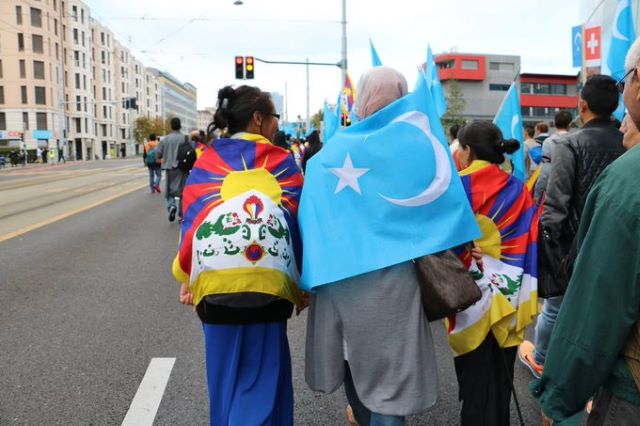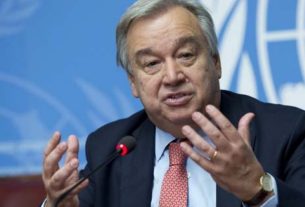TAIPEI, TAIWAN: China’s human rights record will come under public scrutiny Tuesday as the United Nations Human Rights Council holds the fourth Universal Periodic Review Working Group from January 22 to February 2.
As one of 14 states under review at this session, some analysts and rights advocates say the occasion offers a rare opportunity for China to be held accountable for its human rights obligations.
“The Universal Periodic Review is one of the rare opportunities for U.N. member states to give recommendations or comments on the human rights situation in China, so from that point of view, Tuesday’s review is unique,” William Nee, research and advocacy coordinator at Chinese Human Rights Defenders, a U.S.-based activist network, told VOA by phone.
Since its inception in 2008, the UPR has reviewed all 193 U.N. members three times. China’s last review was in November 2018. In preparation for the three-hour review, the U.N. releases three separate reports, including a stakeholder report summarizing concerns shared by NGOs, the U.N.’s assessment of the state of human rights in China, and a national report submitted by Beijing.
In the stakeholder report, international NGOs highlighted China’s lack of commitment to international human rights treaties, the lack of protection of basic rights for Chinese citizens, and the ongoing persecution of ethnic minorities.
Chinese authorities say in their report that they have “accepted” more than 80% of the recommendations put forward by various countries during the last UPR and that they uphold the protection of human rights as “a task of importance” in state governance.
Despite China’s assertion of implementing recommendations from other countries and regularly listening to inputs from NGOs, some experts say the scope of human rights abuses committed by Beijing has expanded since the last UPR in 2018.
“If we look at what Beijing said they had accepted in 2018, we see almost the opposite in the area of protection of freedom of expression, in ensuring rights of minorities and some concerns were raised around business and human rights,” Sarah Brooks, Deputy Regional Director for Asia at Amnesty International, told VOA by phone.
Ahead of Tuesday’s UPR, several human rights organizations and some American lawmakers have highlighted the various kinds of human rights violations committed by Beijing over the last few years, including sending more than one million Tibetan children to boarding schools, the large-scale persecution of the Uyghurs, and the bounties imposed on more than a dozen overseas Hong Kong activists.
“We want to see U.N. member states refer to the different types of abuses that China has committed against the Uyghur people, including the detention camps, bilingual education policies, boarding schools, forced sterilization, and the repressive system that’s still in place,” Zumretay Arkin, the spokesperson for World Uyghur Congress, told VOA in a recorded message.
In its national report, China claims that all ethnic groups have “equal enjoyment of rights in all areas in accordance with the law” and that it has embarked on a path of human rights development that is “suitable to its national conditions.”
Despite Beijing’s defense of its human rights record, some experts say it’s important for concerned U.N. member states to challenge China on a wide range of human rights issues in a smart and accurate way.
“Since the last UPR, U.N. treaty bodies and U.N. human rights experts have produced an incredible amount of communications about [human rights abuses in China] that are very hard-hitting,” Nee from Chinese Human Rights Defenders told VOA. “I hope U.N. member states can use that information and reference human rights laws and standards when formulating their questions for China.”
While the UPR serves as a rare occasion for the international community to scrutinize China’s human rights records, Nee also expects China to push back against criticism of human rights abuses in the country by rallying support from some U.N. member states.
“China is going to get as many countries as possible to give softball questions or praise its human rights record,” he said, adding that Beijing will try to build an alternative narrative around its human rights record.
To attract global attention to human rights persecutions committed by the Chinese authorities, several organizations are organizing relevant events in Geneva this week, including an event focusing on Tibetan human rights and a press briefing examining the outcome of the UPR.
Some analysts say efforts by these organizations can hold the Chinese government accountable.
“These efforts are very important because they are some of the clearest and most factually grounded representations of the Chinese government’s conduct,” Sophie Richardson, former China director at Human Rights Watch, told VOA by phone.
While Beijing will likely dismiss concerns about human rights violations raised by some U.N. member states, Richardson hopes concerned governments will press for an investigation into human rights violations committed by Beijing.
“The scope and scale of human rights violations in China is clear, and the question is whether concerned governments are willing to come together and try to do something about it,” she said.
In her view, since China has committed some acts of transnational repression in other countries, democratic countries now have responsibilities to deal with these challenges.
“I would say democratic countries have more reasons than ever to work in coalition to push back against China’s human rights violations,” Richardson told VOA.__VOA News





